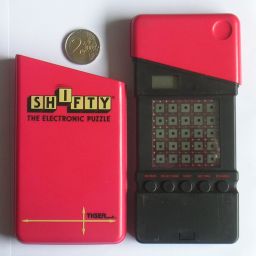


Shifty is an electronic puzzle by Tiger Electronics from 1988. It has an LED display that shows a 5×5 grid of squares, and which is also touch-sensitive so that you can press any of the squares. There is also a separate numerical display that shows the number of moves performed. The 5×5 board should be considered two-sided, with only the front normally being shown. At the start all the squares on the front are white, and all the squares on the unseen back of the board are black. A move consists of shifting a row horizontally or a column vertically in either direction. The squares that shift off one side of the board appear on that side of the hidden back of the board, and vice versa. It is as if the 10 squares involved form a loop wrapped around the board.
There is a button (SEE THRU) that you can press that makes the screen display the hidden side of the board, as if you could see through the front to the layer underneath. A move is performed by pressing a square (making it blink) and then pressing its destination. In this way you can shift a row or column by up to 4 places in a single move.
There are 25 built-in puzzles. The first 10 puzzles have a pattern that you
are supposed to match on the front of the board (the back is allowed to be anything).
In the next 10 puzzles patterns for both the front and back are given, and they
are negative images of each other (i.e. black and white swapped). In the last 5
puzzles the goal patterns for front and back have no relation.
To select a puzzle, hold down the SELECT/VIEW button and press one of the squares
of the board. If you press the SELECT/VIEW button during play it displays the goal patterns.
Finally it is also possible to play a random game. Random moves are performed when you keep down the SCRAMBLE button. In this case the aim is to restore it to the start position (front all white, back all black).
Here is an overview of the buttons:
There are 50 squares on the board (5×5 on both sides) and half of them are black and half of them are white. This gives 50! / 25!2 = 126,410,606,437,752 possible positions. All of these are achievable.
Here are pictures of the 25 built-in puzzles:
| 1. |
| |||||||||||||||||||||||||||||||||||||||||||||||||||
| 2. |
| |||||||||||||||||||||||||||||||||||||||||||||||||||
| 3. |
| |||||||||||||||||||||||||||||||||||||||||||||||||||
| 4. |
| |||||||||||||||||||||||||||||||||||||||||||||||||||
| 5. |
| |||||||||||||||||||||||||||||||||||||||||||||||||||
| 6. |
| |||||||||||||||||||||||||||||||||||||||||||||||||||
| 7. |
| |||||||||||||||||||||||||||||||||||||||||||||||||||
| 8. |
| |||||||||||||||||||||||||||||||||||||||||||||||||||
| 9. |
| |||||||||||||||||||||||||||||||||||||||||||||||||||
| 10. |
| |||||||||||||||||||||||||||||||||||||||||||||||||||
| 11. |
|
| ||||||||||||||||||||||||||||||||||||||||||||||||||
| 12. |
|
| ||||||||||||||||||||||||||||||||||||||||||||||||||
| 13. |
|
| ||||||||||||||||||||||||||||||||||||||||||||||||||
| 14. |
|
| ||||||||||||||||||||||||||||||||||||||||||||||||||
| 15. |
|
| ||||||||||||||||||||||||||||||||||||||||||||||||||
| 16. |
|
| ||||||||||||||||||||||||||||||||||||||||||||||||||
| 17. |
|
| ||||||||||||||||||||||||||||||||||||||||||||||||||
| 18. |
|
| ||||||||||||||||||||||||||||||||||||||||||||||||||
| 19. |
|
| ||||||||||||||||||||||||||||||||||||||||||||||||||
| 20. |
|
| ||||||||||||||||||||||||||||||||||||||||||||||||||
| 21. |
|
| ||||||||||||||||||||||||||||||||||||||||||||||||||
| 22. |
|
| ||||||||||||||||||||||||||||||||||||||||||||||||||
| 23. |
|
| ||||||||||||||||||||||||||||||||||||||||||||||||||
| 24. |
|
| ||||||||||||||||||||||||||||||||||||||||||||||||||
| 25. |
|
|
Number the rows 1 to 5 from top to bottom, and label the columns
from left to right with the letters A to E. The directions Up, Down,
Left, and Right will be denoted by the letters u, d, l, r. Any move
can then be denoted by the row or column letter, a direction letter,
and a number indicating the distance moved. For example 3r2 means
moving the middle row two squares to the right.
Sometimes a distance of 5 is used, and in practice that has to
be done in two moves.

If x is any of the three middle rows, then the 3-cycle of pieces shown in the picture on the right can be achieved by doing the move sequence Eu1 xr2 Ed1 xr1 Eu1 xl1 Ed1 xl2 twice. With this move sequence it becomes easy, if tedious, to solve any position.
Not all of these solutions are optimal, so let me know if you find better ones.